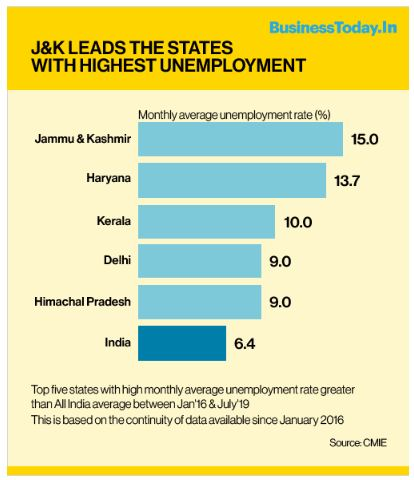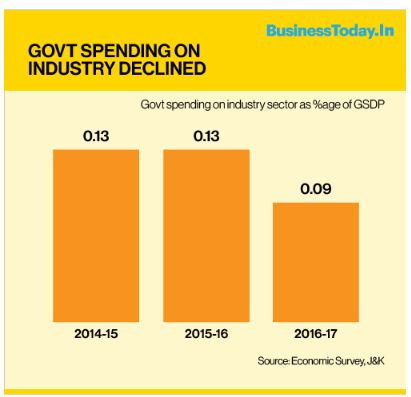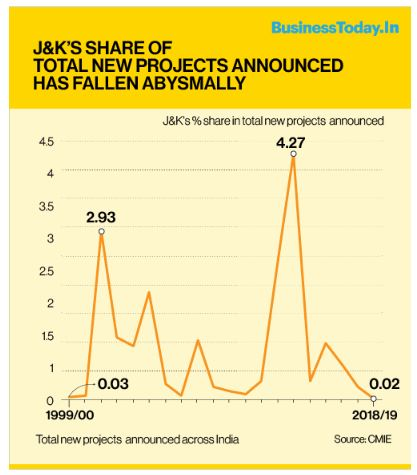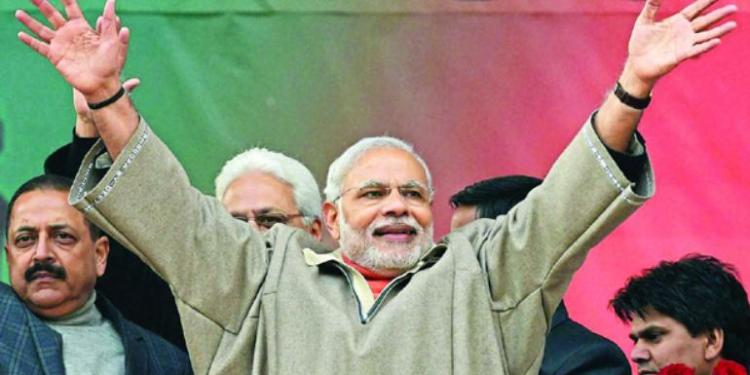The abolition of Article 370 will integrate the economy of the state of Jammu and Kashmir with the fast developing Indian economy. Jammu and Kashmir has enormous potential for economic growth but due to lack of industries in the state and corrupt politics, the people of the state were deprived of opportunities.
The erstwhile state of Jammu and Kashmir has one of the highest unemployment rates at 15 percent, as per data from CMIE. This is more than double of the national average of 6.4 percent of the national average. The state is followed by Haryana and Kerala which have 13.7 percent and 10 percent respectively.

The manufacturing activities in the state have been limited to handicrafts. The manufacturing in other sectors has not picked up and the government spending on industry declined from 0.13 percent of state GDP to 0.09 percent in 2016-17.

The share of the state in total new projects has declined from 4.3 percent in 2013-14 to 0.02 percent in 2018-19.

Post Article 370 abolition, the central government has asked the industry leaders to spur the investment in the state. The central government has decided to fast track the Srinagar metro project by recruiting 1,300 engineers. The 5,108 crore rupees metro project will have two corridors Indira Nagar to HMT Junction and Hazuribagh to Osmanabad through Srinagar.
Another big project announced in the state is Steelbird Helmet manufacturing unit. The company will set up a manufacturing outlet before the investment summit which is announced to be held in the month of October.
Uday Kotak, President-designate of Confederation of Indian Industry (CII) and veteran banker has called for investment in the state. “The region’s per capita NSDP at Rs 63,995 stands at about 55% of the national average, and agriculture accounts for 80% of the output. Strong efforts from the Government and industry, including local businesses, are the need of the hour to raise its growth rate and create new opportunities for employment and livelihoods,” said Kotak.
Amul, the popular dairy products cooperative has expressed interest about investment in the region. Lemon Tree, major players in the hospitality industry has proposed two new hotels in Gulmarg and Sonmarg with 35-40 beds capacity. The company already has hotels in Katra, Jammu, and Kashmir.
CII is partnering with the government of Jammu & Kashmir to organize investors summit in October this year. “CII would continue to work with the new administration in the two union territories of Jammu and Kashmir and Ladakh for ensuring faster development in this vital region of the country,” said the industry body.
The state of health, education and other socio-economic condition of Jammu & Kashmir is better than many other well-off states of the country. The state has far higher social spending than the rest of the country. The per capita social spending in J&K is around 12,000 rupees per year while for the rest of the country it is only 8,500 rupees.
But Jammu & Kashmir is one of the most pampered states of the country with 73.6 percent of the state’s total revenue from central government while the state generates only 26 percent of total revenue. So the state is better compared to other North Indian peers because central government spends a lot. As per an article published by The Hindu on July 24 written by TCA Sharad Raghavan, J&K gets 10% of central funds with only 1% of the population.
As Article 370 is abolished and private investment in the state increases, the state would not need to be dependent on the central government. It could generate majority of the revenue through its own resources as the industrial and corporate activity in the state increases.

























